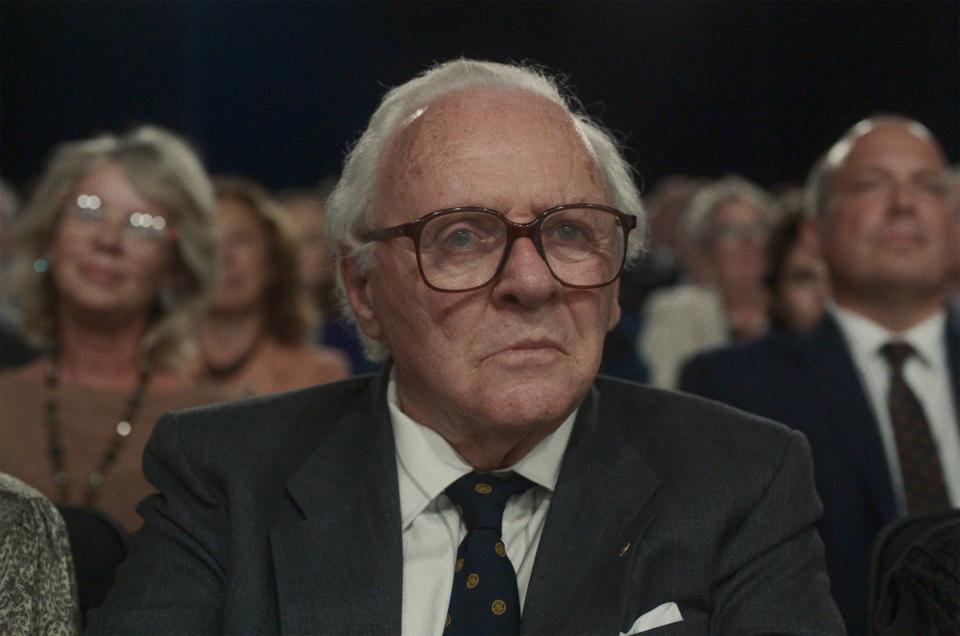Anthony Hopkins' 'One Life' brings emotion, decency to Holocaust tale and Moxie screens
- Oops!Something went wrong.Please try again later.
Sitting through “One Life,” the new Anthony Hopkins film premiering at the Moxie Cinema this weekend, I could not help but think about my reaction to “The Zone of Interest.”
Both received wide release in the past two months and both tell stories of the Holocaust. Yet those stories are told in different ways. I reacted more emotionally and more favorably to “One Life,” which puts me in the distinct minority of critics.
But the experience allows me to think about that contrast, and how it defines what it means to feel something from a movie. In turn, by revealing how I reacted, I can provide a guide in helping you decide if “One Life” is worth your time.
The primary focus of the story is set in 1987 Britain. Nicholas Winton (Hopkins) is going through files in his office and finds an old briefcase. Hopkins conveys the significance of these moments while saying little, if anything.

The film flashes back to the dark period after the Munich Agreement, when Winton (played in younger years by Johnny Flynn) travels through Czechoslovakia and encounters Jewish families from Austria and Germany who fled the Nazis, only to learn they remain in the path of danger.
Winton, privileged with a rich family and a lofty gig as a stockbroker, cannot help but be moved into action. With help from his mother (Helena Bonham Carter), he develops a plan to relocate the children to England and temporarily into foster homes so they might be safe during the war.
His efforts led to nearly 700 children being saved. Yet the Winton in more recent times cannot help but be haunted by those he did not save. He goes to the press, hoping someone will tell the story — perhaps he can learn more about those he couldn’t reach. Did they survive?
These efforts are picked up by a chintzy television show called “That’s Life,” where Winton appears and is put face-to-face with the children he did save as well as their descendants.
Folks, I gotta tell ya this got to me. My heart filled. My eyes welled up. I wanted to stand and applaud in my living room. It’s an easy emotion to conjure, but it did not feel unearned, largely because Hopkins is so masterful in underplaying the moment. He is emotional to be sure, but there’s an unspoken dignity to his reaction.
Watching a man, who has otherwise never drawn attention to his heroic efforts, finally face the multitude of life and humanity that sprang from his good deeds is too much for me not to be moved.
Even with a strong story and exceptional performances at its heart, “One Life” is melodramatic at times and perhaps overly sentimental. Which could be fatal to a film about one of the most evil episodes in modern history. Further, it would seem simplistic compared with the balancing act of “The Zone of Interest,” a film wanting to be a larger statement about how people turn a blind eye to inhumanity and suffering.
Yet I found “Interest” false, because that Oscar-winning film assumes complicity or tolerance among fellow humans for the suffering of others. That’s a claim that can be made. Yet it’s made with such cold cynicism that I didn’t buy the argument of immoral equivalence.
“One Life” may be earnest, but it's also genuine and heartfelt. When plans to help one group of children escape goes awry, that anguish is palpable. It has actors conveying the horror of the moment and creating a feeling among the audience. These two films about the Holocaust are going for different things, but “One Life” accomplishes its goals more effectively.
Or maybe, despite my own cynicism that often veers into a sense of despair, I want to believe in the goodness of people. That films like “One Life” confirm our humanity in the face of the worst impulses of others. If the film sounds similar to “Schindler’s List," that’s not lost on me. A rich guy uses means to help people escape mortality despite his own shortcomings.
But that’s probably why Spielberg is one of my favorite filmmakers: his eye towards finding the hero in the darkness of the world is so stark and so pure. These films make me believe it.
“The Zone of Interest” wants to make an argument that even innocent people, in the traditional sense of the word, are also complicit and therefore guilty by default. Perhaps I do not buy that worldview. Hopefully, you don’t either.
“One Life” is a conventional story without sharp edges. But it is compelling and thrilling in its decency and earns its right to manipulate the audience.
James Owen is the Columbia Daily Tribune’s film columnist. In real life, he is a lawyer and executive director of energy policy group Renew Missouri. A graduate of Drury University and the University of Kansas, he created Filmsnobs.com, where he co-hosts a podcast. He enjoyed an extended stint as an on-air film critic for KY3, the NBC affiliate in Springfield, and now regularly guests on Columbia radio station KFRU.
This article originally appeared on Columbia Daily Tribune: Anthony Hopkins' 'One Life' brings emotion, decency to Moxie screens

